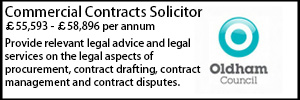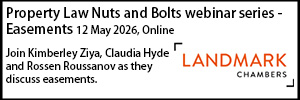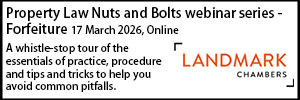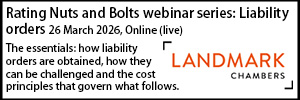COVID-19 - Code of principles on commercial leases
- Details
The Government has issued a new Code of Practice for commercial property relationships: What does it mean for landlords and tenants? Sara Bailey, Yvette Bryan and Nick Levy explain.
The Ministry of Housing, Communities and Local Government has recently issued a new Code of Practice for commercial property relationships during the Covid-19 pandemic.
This voluntary Code is intended to support businesses coming together to negotiate affordable rental agreements, and has the support of signatory organisations including the BCC, BPF, BRC, CREFC, Revo, RICS and UKHospitality until 24 June 2021.
Having been involved by providing legal advice during the Code's development, we have answered below some of the main questions that you may have on the Code – whether you are a landlord or tenant.
If you have any other questions about the effect of the Code, or if you need help negotiating or documenting any rent arrangements, please don't hesitate to get in touch with us.
Frequently asked questions
If you are a landlord, you may want to know:
- Am I legally bound by the Code? No, it is a voluntary Code - but it is intended to communicate best practice and has been endorsed and supported by the representative bodies and organisations that have signed up to it.
- Does the Code vary my tenants' leases? No, the Code does not change the underlying legal relationship or lease contacts (as varied by any binding rent concession arrangements that you may have already have in place with your tenants) - but the Code encourages you and your tenants to act reasonably and responsibly, recognising the impact of Covid-19, to identify mutual solutions where they are most needed
- What information can I request from tenants who ask for a rent concession? The Code asks tenants to be clear with you about what is needed. The Code asks tenants to be prepared to be transparent and explain their request to you by providing financial information about their business, to an appropriate and relevant extent (which may differ from case to case).
- What factors should I take into account when considering a tenant's request for a rent concession? The Code asks both parties to take into account long-term business viability, available resources, duties and other stakeholders. Section 21 of the Code sets out some issues you may wish to bear in mind (though there may be others) when assessing the extent of the financial impact of Covid-19 on your and your tenant's entire business. The Code encourages you to support your tenants where reasonably possible, whilst having regard to your own financial commitments and fiduciary duties.
- What types of rent concessions could I consider agreeing with a tenant? Several different options are suggested at Section 23 of the Code - but these are not exhaustive and you and your tenants may wish to suggest and come to other arrangements. Ultimately, you should try to find something that works for you and your tenant.
- Does the Code change any existing rent concession arrangements I have in place? No - any existing binding arrangements will continue to have legal effect unless otherwise agreed.
- Do I have to change my service charge arrangements? The Code asks tenants to continue to pay their service charge and insurance charge in full unless otherwise agreed. Landlords are however encouraged to manage their service charges in line with Section 24 of the Code, which amongst other things contains provisions relating to the nature and extent of services provided, as well as timing for payment.
- Does the Code only apply to retail, leisure and hospitality? No – it applies to commercial leases held by businesses which have been seriously negatively impacted by the Covid-19 crisis, whether, for example, in the hospitality, retail, leisure, office, industrial and logistics, ports or rural sectors - but it is expected that the hospitality, leisure and parts of the retail sectors will have most need of it.
- Can I still withdraw from a tenant's rent deposit if they have not paid their rents? Yes, the Code does not prohibit you from doing that (if the terms of the rent deposit allow you to) – but if you do make a withdrawal, the Code suggests you may not want to require your tenant to "top up" the rent deposit again before it is realistic and reasonable to do so.
- Do I need to seek legal advice when agreeing a rent concession? That is advisable, to ensure that your rent concession is binding and that your position is protected.
- Am I in breach of the Code if I cannot agree a rental concession with a tenant, despite following the guidance in the Code? The Code acknowledges that there will be circumstances where parties are unable to reach agreement and that other measures may be necessary. If you refuse a rent concession, the Code asks that you are clear with your tenant about why you are doing so.
If you are a tenant, you may want to know…
- Does the Code mean I don't have to pay my rent? No – the legal position remains unchanged. So you still have to pay your rents and other payments in accordance with your lease (as varied by any existing binding rent concession arrangements), unless otherwise agreed with your landlord.
- Does my landlord have to agree to my request for a rent concession? No - it is a voluntary Code. But you may want to direct your landlord to the Code, as it sets out the best practice guidelines encouraged by government and supported by the representative bodies and organisations who have signed up to it.
- Who should start the process of agreeing a rent concession? If your business has been seriously negatively impacted by the Covid-19 crisis so that you cannot pay in full, you should approach your landlord to request a concession. Your landlord does not have to proactively offer you a concession.
- Should I formally document a concession? It is advisable to have a paper trail and to take legal advice to ensure that your rent concession is binding and your position is protected.
- What information do I have to provide to my landlord if I request a rent concession? The Code asks you to be clear with your landlord about what is needed. You should be prepared to be transparent and explain your request by providing financial information about your business, to an appropriate and relevant extent (which may differ from case to case). It is for you to persuade the landlord to agree, so it is advisable to provide whatever information is best going to do that.
- Can I request a concession for service charge as well as rent? Yes – but again the Code is voluntary so the landlord is not obliged to agree. The legal position is that you are liable for covenants and payment obligations under your lease, unless otherwise agreed with your landlord. Service charges and insurance charges are not profit-making and are necessary charges to protect buildings. The Code says that service charge and insurance charges need to be paid in full unless otherwise agreed. You may also wish to direct your landlord to Section 24 of the Code.
- Does the Code apply only to retail, leisure and hospitality? No – it applies to commercial leases held by businesses which have been seriously negatively impacted by the Covid-19 crisis, whether, for example, in the hospitality, retail, leisure, office, industrial and logistics, ports or rural sectors - but it is expected that the hospitality, leisure and parts of the retail sectors will have most need of it.
- Is a rent concession legally binding? Yes, if drawn up correctly – it is advisable to take legal advice.
- What happens if I can't pay in full because of the impact of Covid-19 on my business? The legal position remains unchanged: you are liable for covenants and payment obligations under your lease (as varied by any existing binding rent concession arrangements), unless otherwise agreed with your landlord. At the time of writing, there are temporary restrictions on some landlord remedies for non-payment (these are separate to the Code) but these do not alter your underlying payment obligations and are time limited. So if you are unable to pay in full, you should have a conversation with your landlord and try to seek an agreement with them. If that is not possible, you should seek specialist professional advice.
- Does the Code apply to me if I am unable to pay, but not because of Covid-19? No – the Code applies only to commercial leases held by businesses which have been most seriously negatively impacted by the Covid-19 crisis. In any circumstances where you are unable to pay your rent, you should seek specialist professional advice.
- Does the Code mean that I am allowed to stop paying rent if my property has been closed or unoccupied during lockdown? No - the legal position is that you are liable for covenants and payment obligations under your lease, unless otherwise agreed with your landlord. So if you are unable to pay in full, you should have a conversation with your landlord and try to seek an agreement with them.
- Do I need to seek legal advice when agreeing a rent concession? That is advisable, to ensure that your rent concession is binding and that your position is protected.
Sara Bailey is managing partner and Yvette Bryan and Nick Levy are partners at Trowers & Hamlins. Sara can be reached on 020 7423 8288 or
Sponsored articles
Unlocking legal talent
Walker Morris supports Tower Hamlets Council in first known Remediation Contribution Order application issued by local authority
Legal Officer
Senior Solicitor - Property
Legal Director - Government and Public Sector
Locums
Poll















































